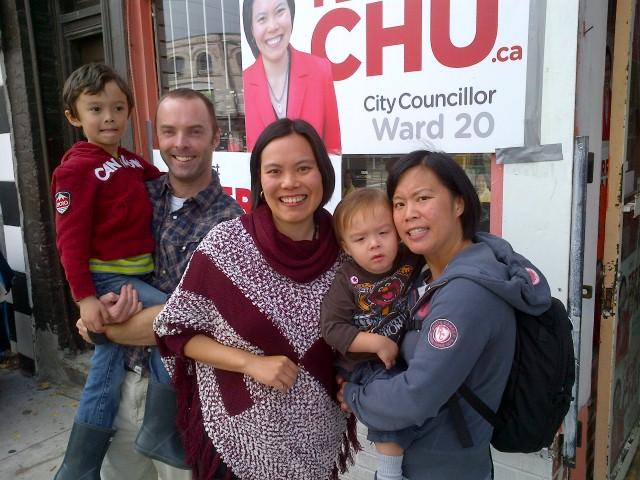I believe we've established that Terri Chu, Councilor candidate in Ward 20, is an engineer, a civic leader, a pilot, scuba-diver, community organizer and baker of amazing peach pies. Oh, and she founded Why Should I Care and has been a committed bicycle commuter.
But I'm gonna guess you didn't know what a tenacious fighter against wasted dollars and inequity she is.
Let us set the scene a bit. It's 2008 and Terri's husband is a professor working at University of Cape Coast in Ghana. Terri is there for the duration, doing what Terri does; getting involved in the community, identifying structural problems and suggesting solutions on a blog clearly labeled (Author: Terri, Thoughts and Ideas).
Here's an excerpt from her blogpost:
However, it still irks me to see all the SUVs (really expensive ones) on campus that are purchased with non-private dollars. Few people I’ve asked can say exactly where the money comes from, but most suspect it’s either the university budget or the GET (Ghana Education Trust) Fund money. In addition to what I consider to be unnecessary spending of Ghanaian tax payer money, I’m concerned about the link to Canadian tax payer money. (Forgive me yet again for being Canadian centric on this post.)
To summarize - Terri saw what felt to her like a misuse of public funds; she did her homework on the issue and then had the temerity to call the public official abusing dollars, including Canadian donations, to account.
It was Ghana, and she was there as spouse of an temporary foreign worker; they couldn't get to Terri, but the university had no problems taking out their revenge on Stephen.
Stephen was hauled into the President's office and fired on the spot. They then asked if he had any questions. Stephen asked one: "I thought Ghana had Freedom of Speech."
The answer yelled back at him was "Yes, but you used your freedom of speech wrong. You have the freedom to say good things about the university. What you did was not appropriate."
This is why I love these two - they stand together, no matter what. Terri had written a post that clearly troubled the University enough for them to take action against Terri's husband. He had her back the whole way, as she has is.
And they both have the backs of those on the team.
It's been an amazing experience working with Terri on Why Should I Care - she is the most respectful, yet mission-oriented leader I know. She'll let you know where you've messed up, but with the intention of getting things back on track.
When it comes to misinterpretations or blatant abuses of rights and responsibilities, however, she has zero patience.
Of course, Terri's arsenal doesn't consist of attack ads or bullying comments - she brings her technical expertise, wit and way with words to the table. Terri will be fearless in going toe-to-toe with developers, public servants and fellow Councilors alike and win her case on the facts and the conviction with she presents them.
Terri Chu had no qualms standing up for citizens and respect for public dollars in Ghana - she's successfully managed some massive infrastructure projects in town; just imagine what she can achieve at City Hall.
This it a woman you want in your corner, Ward 20.

